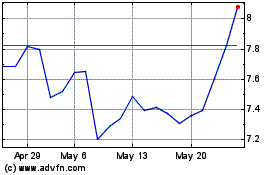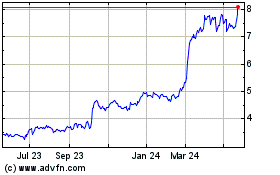Italy to Offer Financing for Investment in Iran
January 18 2016 - 7:00PM
Dow Jones News
The Italian government is planning to offer up to €8 billion
($8.71 billion) in financing for companies to invest in Iran, as
they expect Italian exports to Iran to quadruple in two years.
Under the terms of the agreement announced Saturday, the United
Nations lifted its sanctions on Iran, and the European Union and
the U.S. lifted their nuclear-related measures. U.S. President
Barack Obama immediately issued an executive order revoking earlier
orders that imposed nuclear sanctions on Iran, and the names of
hundreds of people and companies removed from U.S. blacklists were
released in a single list.
Italy—which had strong ties with Iran before the sanctions—is
eager to benefit from potential business opportunities arising. The
government has been trying to pave the way to revamp trade
relations in the last months and is working to help Italians get
closer to investors and prospective clients in Iran. Vice Minister
for the Economic Development Carlo Calenda already visited Iran
this past November to help nearly 400 Italian firms meet Iranian
prospective counterparts. He said he would go back every few months
to check on the progress made by Italy's corporate world.
"We see all the elements lined up to reach a target of €4
billion in exports with Iran by 2017," Mr. Calenda said in an
interview Monday. He added that at the moment, exports are at €1
billion.
Mr. Calenda said export credit company SACE—controlled by
State-controlled lender Cassa Depositi e Prestiti -- is getting
ready to make available up to €8 billion in financing for Italian
firms that want to have business in Iran. He also said the Bank of
Italy is in talks with the Bank of Iran to open the branch of an
Iranian bank in Italy in a move to make financial transactions
easier. He expects an agreement to come by March.
According to SACE, Italy's loss from the sanctions has been
"significant", noting that the trade exchange between the two
countries had dropped to €1.6 billion in 2014 from €7.2 billion in
2011, the year in which sanctions were made harsher.
Exports of machinery alone, which in 2014 accounted for 58% of
the total, fell 29% over the 2011 to 2014 period, SACE said.
Italy's corporate world hasn't been caught by surprise with the
sanction relief process. Several companies with strong ties to Iran
before the sanctions haven't left the country, although business
slowed down significantly.
Some have kept a small presence in the country, which they are
looking to expand now. Some are refreshing their old contacts. For
instance, Fadis, a textile machinery company, tried to keep its old
clients over the sanction years by selling them spare parts when
needed. But now that local carpet makers will have the chance to
increase production and possibly turnover, they hope they will need
up-to-date machinery.
"Iran has old petrochemical plants," said Fabrizio Di Amato,
president of Maire Tecnimont—a company that designs and builds oil
and gas processing and petrochemical plants—as he added that the
firm will be a candidate to upgrade or complete existing
plants.
Mr. Di Amato said his company could make plants to produce
fertilizers in the country, for example, using cheap Iranian gas
and exporting the output to India, an important buyer of
fertilizers. Transportation costs would lower significantly if they
are made in Iran rather than in farther away countries, he
said.
Oil giant Eni SpA, has been visiting Iran in recent months to
rekindle ties, too. "No doubts Iran is interesting [as an
investment opportunity]," Eni's chief executive, Claudio Descalzi,
said in a television interview Sunday. "I am happy that Iran is
returning [to energy markets]…it means Europe has a more
diversified supply for its energy."
The Italian government's next mission to Iran is slated for
February, where Maire Tecnimont and other firms will meet local
businesses, government representatives and potential investors.
"What we found in Iran when we went on a mission in November was
a strong entrepreneurial class," Mr. Calenda said. "They know how
to make business."
Pietro Piccinetti, the chief executive of Pordenone Fiere, which
organizes trade events for Italian small and medium-size
businesses, said last week that he also brought about 60 companies
in the furniture business to Tehran so that they could meet
potential customers.
Yet doubts remain about how quick such opportunities will become
real. In an interview Friday, Italian Foreign Minister Paolo
Gentiloni warned that, while the Iranian economy offers
opportunity, business may not yet rush to invest there quite
yet.
"The Iranian economy is in decent shape. It has had to
differentiate more than other countries in the region over the
years due to the sanctions," he said. "The interest (from business)
is enormous in several sectors. Although in the energy sector,
because of (low) oil prices, the break-even point on oil projects
is so low that multinationals won't probably be rushing there quite
yet."
Write to Manuela Mesco at manuela.mesco@wsj.com and Liam Moloney
at liam.moloney@wsj.com
(END) Dow Jones Newswires
January 18, 2016 19:45 ET (00:45 GMT)
Copyright (c) 2016 Dow Jones & Company, Inc.
Maire (BIT:MAIRE)
Historical Stock Chart
From Oct 2024 to Nov 2024

Maire (BIT:MAIRE)
Historical Stock Chart
From Nov 2023 to Nov 2024
